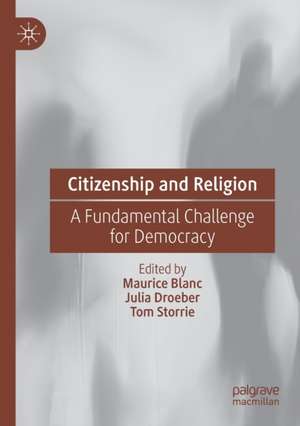Citizenship and Religion: A Fundamental Challenge for Democracy
Editat de Maurice Blanc, Julia Droeber, Tom Storrieen Limba Engleză Paperback – 18 dec 2021
The chapters provide an alternative narrative of the role of religion, presenting diverse ‘lived shades’ of citizenship, as well as accounting for issues of gender equality, minority rights, violence, identity, education, and secularisation. As the renewed role of religious institutions is increasing in Europe and elsewhere, the contributors interrogate the experience of belonging, public policy, welfare services and religious education, highlighting how cooperation between citizenship and religion is necessary in a democratic regime. The research will be of interest to students and scholars across sociology, international relations, and religious studies.
| Toate formatele și edițiile | Preț | Express |
|---|---|---|
| Paperback (1) | 725.61 lei 6-8 săpt. | |
| Springer International Publishing – 18 dec 2021 | 725.61 lei 6-8 săpt. | |
| Hardback (1) | 730.79 lei 6-8 săpt. | |
| Springer International Publishing – 17 dec 2020 | 730.79 lei 6-8 săpt. |
Preț: 725.61 lei
Preț vechi: 884.89 lei
-18% Nou
Puncte Express: 1088
Preț estimativ în valută:
138.84€ • 151.29$ • 116.100£
138.84€ • 151.29$ • 116.100£
Carte tipărită la comandă
Livrare economică 23 aprilie-07 mai
Preluare comenzi: 021 569.72.76
Specificații
ISBN-13: 9783030546120
ISBN-10: 3030546128
Pagini: 272
Ilustrații: XVIII, 272 p. 1 illus.
Dimensiuni: 148 x 210 mm
Greutate: 0.39 kg
Ediția:1st ed. 2020
Editura: Springer International Publishing
Colecția Palgrave Macmillan
Locul publicării:Cham, Switzerland
ISBN-10: 3030546128
Pagini: 272
Ilustrații: XVIII, 272 p. 1 illus.
Dimensiuni: 148 x 210 mm
Greutate: 0.39 kg
Ediția:1st ed. 2020
Editura: Springer International Publishing
Colecția Palgrave Macmillan
Locul publicării:Cham, Switzerland
Cuprins
1. Introduction: Citizenship, Religion and Moral Values.- Part I. Our Struggles with Citizenship, Religion and Secularism.- 2. Citizenship and Religion: A British Perspective.- 3. Citizenship, Secularism and Religion: A 'Triangle' in Permanent Tension.- 4. How is it to be Muslim in France?.- 5. Are Algerian Women Full Citizens?.- 6. Citizenship under Occupation.- 7. 'Ecumenical' Citizenships and Belonging.- Part II. Is Religion a Resource or a Barrier for Active Citizenship?.- 8. It's the Culture, Stupid! Cultures Maintain a Strong Hold on their Members.- 9. The Elusiveness of the Word 'Citizenship' in Connection to Religion.- 10. Daughters Against Fathers: How Islam Builds a New Social Fabric in Contemporary Algeria.- 11. French Youth and Secularism: Towards a Social Polarisation.- 12. The Place of Islam within a Secular France and Europe: How to Avoid the Traps of the So-Called Islamic Extremism.- 13. 'Islam Does Not Belong to Germany' or How Some German Citizens Have Rediscovered Religions.- 14. Conclusion: Where Do We Go From Here?.
Notă biografică
Maurice Blanc is Emeritus Professor of Urban Sociology at Strasbourg University, France.
Julia Droeber is Assistant Professor of Islamic Pedagogy at Ludwigsburg University of Education, Germany.
Tom Storrie (†) was Principal of Colleges of Further and Higher Education in the UK and Associate Professor of the UNESCO Centre for Human Rights and Development at An-Najah University, Nablus, Palastine.
Julia Droeber is Assistant Professor of Islamic Pedagogy at Ludwigsburg University of Education, Germany.
Tom Storrie (†) was Principal of Colleges of Further and Higher Education in the UK and Associate Professor of the UNESCO Centre for Human Rights and Development at An-Najah University, Nablus, Palastine.
Textul de pe ultima copertă
This book explores the relationship between religion and citizenship from a culturally diverse group of contributors, in the context of the developing tendency towards fundamentalist and conflicting religious beliefs in European, North African, and Middle Eastern societies.
The chapters provide an alternative narrative of the role of religion, presenting diverse ‘lived shades’ of citizenship, as well as accounting for issues of gender equality, minority rights, violence, identity, education, and secularisation. As the renewed role of religious institutions is increasing in Europe and elsewhere, the contributors interrogate the experience of belonging, public policy, welfare services and religious education, highlighting how cooperation between citizenship and religion is necessary in a democratic regime. The research will be of interest to students and scholars across sociology, international relations, and religious studies.
The chapters provide an alternative narrative of the role of religion, presenting diverse ‘lived shades’ of citizenship, as well as accounting for issues of gender equality, minority rights, violence, identity, education, and secularisation. As the renewed role of religious institutions is increasing in Europe and elsewhere, the contributors interrogate the experience of belonging, public policy, welfare services and religious education, highlighting how cooperation between citizenship and religion is necessary in a democratic regime. The research will be of interest to students and scholars across sociology, international relations, and religious studies.
Caracteristici
Takes a dialogical approach to understand the relationship between citizenship and religion Explores the authors' own biographical experience of religion within their own cultural and political society Contributes an unseen perspective through personal insight
